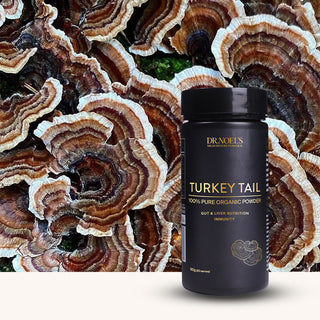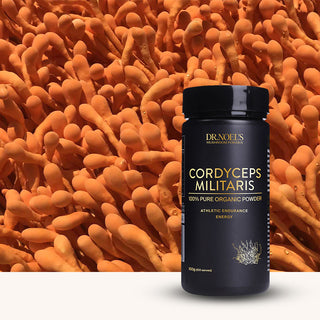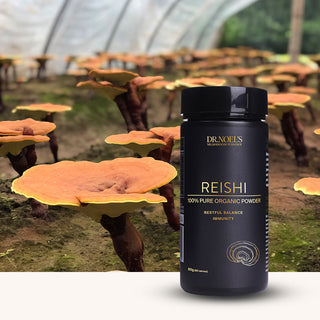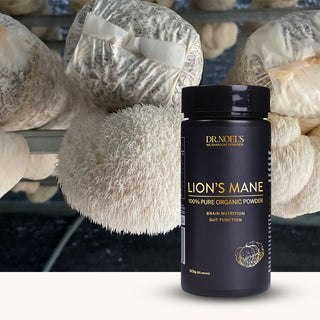If you’re looking for an all-natural way to improve your skin health, you may want to consider lion’s mane mushroom. This potent fungi has been used for centuries in Traditional Chinese Medicine for a variety of purposes, including supporting skin health.
Lion’s mane mushroom contains several compounds that are beneficial for the skin. These include hericenones and erinacines, both of which have powerful antioxidant capabilities. Antioxidants help to protect the skin from damage caused by free radicals, which can lead to premature aging and other skin problems.
In addition, lion’s mane mushroom also contains beta-glucans. Beta-glucans are a type of soluble fiber that can help to keep the skin hydrated and promote collagen production. Collagen is a protein that is essential for skin health, so increasing its production can help to keep the skin looking young and healthy.

Lion’s Mane Benefits For The Skin
More people are using medicinal mushroom products to improve their general skin health, and even treat specific skin conditions such as eczema, psoriasis and more recently, topical steroid withdrawal. While more research is required, the following information is a list of how Lion’s mane can be used to create homeostasis in the body and improve the skin.

1. Skin Wound healing
Skin healing is the process by which the skin repairing itself after an injury. In order to heal, the skin needs both oxygen and nutrients, which it gets from the blood. The first step in healing is for the blood to clot, which cuts off the flow of oxygen and nutrients. This allows the body to start repairing the damage.
The next step is for white blood cells to clean up the area by eating any bacteria or dead tissue. This helps to prevent infection. The next step is for new skin cells to grow and replace the damaged ones. Finally, the new skin will start to produce collagen, which helps to give it strength and elasticity.
The entire process can take anywhere from a few days to a couple of weeks, depending on the severity of the wound. Extracts from lion’s mane mushrooms may provide healing benefits for skin wounds.
A recent study on rats with neck wounds found that topical application of lion’s mane extract led to faster healing.
2. Nervous system recovery
When the skin is damaged, it can take time to heal. This is because the skin needs to regenerate new cells to replace the damaged ones. The process of regeneration is controlled by the nervous system. The nervous system is responsible for sending signals to the brain that tell the body how to repair itself. When the nervous system is damaged, these signals can be disrupted, which can slow down or prevent the skin from healing properly.
Damage to the nervous system can have significant effects on skin health.
Some research suggests that extracts of lion’s mane mushrooms may encourage nerve cells to grow and repair more quickly.
One study showed that rats with nerve damage receiving a daily extract of lion’s mane mushrooms had quicker nerve regeneration than control animals.
3. Immune function
The skin is an important part of the immune system, helping to keep harmful bacteria and viruses out of the body.
There are two main types of immune cells in the skin: Langerhans cells and dendritic cells. Langerhans cells are found in the upper layer of the skin (the epidermis) and are responsible for detecting pathogens and triggering an immune response. Dendritic cells are found in the lower layer of the skin (the dermis) and help to provide a barrier against infection.
The immune system is constantly working to protect us from illness, but sometimes it can overreact and cause inflammation. This can lead to conditions like eczema, psoriasis, and contact dermatitis. There are many things that can weaken the skin’s immune system, including stress, lack of sleep, and certain medications. People with weakened immune systems are more likely to develop skin infections.
Lion’s mane mushrooms may enhance the immune system, partly by reducing inflammation and preventing oxidation.
Research on mice suggests that lion’s mane mushrooms may boost the activity of the intestinal immune system.
Another study on mice indicates that a protein in lion’s mane mushrooms encourages the growth of beneficial gut bacteria that strengthen immunity.
4. Antiviral
Viral infections of the skin are particularly common, and can cause a range of symptoms including rashes, blisters, and itching. While most viral skin infections are not serious and will resolve on their own, some can be more severe and may require treatment.
There are many different types of viruses that can infect the skin, but some of the most common include herpes simplex virus (HSV), varicella-zoster virus (VZV), and human papillomavirus (HPV), and Eczema herpeticum, commonly associated with topical steroid withdrawal. These viruses can be spread through direct contact with an infected person, or by touching contaminated surfaces.
A lectin found in lion’s mane inhibits HIV-1 reverse transcriptase activity, which is important for the HIV virus to reproduce itself [1].
5. Antioxidant Activity
Many skin problems are caused by toxins that build up in the body. These toxins come from the food we eat, the air we breathe, and the products we use on our skin. The best way to improve your skin health is to detoxify your body and rid it of these harmful toxins.
Lion’s mane mushrooms have powerful antioxidant properties. A boiled extract of the mushroom had antioxidant activity in a dish which was about 17% as strong as quercetin [2].
6. Skin Aging
Accelerated skin aging is commonly associated with overexposure of harmful UV rays, and presents itself as roughness, dryness, sagging skin, age spots, and changes in skin color.
Lion’s mane has anti-aging effects on the skin. Polysaccharides in Lion’s Mane mushrooms have been been found to enhance antioxidant enzyme activities and increase collagen levels in aged rat skin [3].
7. Gut Health
Gut health and the skin are inextricably linked. An unhealthy digestive system can manifest itself on the skin in a number of ways – from acne and eczema to psoriasis and dermatitis. The gut-skin connection is a two-way street. Not only can an unhealthy gut lead to skin problems, but skin conditions can also worsen digestive issues.
A recent study found that Lion’s mane extract can protect against alcohol-induced stomach lining injury and ulcers in rats [4, 5].
Another study found that Lion’s mane can protected against gastritis [6] and colitis, by potentially suppressing inflammatory cytokines and reducing intestinal bleeding [7].
H. pylori Growth
Lion’s mane inhibited the growth of H. pylori in several cell studies. This activity has not been investigated in an animal model, let alone in humans [8, 9, 10].
8. Circulation
Poor circulation can lead to a number of skin problems, including dull skin, dry skin, and inflammation. When the blood flow is restricted, the skin doesn’t get the oxygen and nutrients it needs to stay healthy. This can lead to premature aging and a loss of elasticity. In addition, poor circulation can contribute to the formation of varicose veins.
A study found that alcohol extracts of lion’s mane mushrooms inhibit the production of excess blood vessel cells in rats. Excess blood vessel cells contribute to atherosclerosis [11].
In a cell study, hericenone B, a compound found in Lion’s Manes mushrooms, inhibited human and rabbit platelet aggregation, suggesting a possible role for lion’s mane in preventing clots.
9. Inflammation in the skin
Inflammation is a vital process in the body that helps to protect us from infection and disease. However, when inflammation goes into overdrive, it can have a detrimental effect on our health – including the health of our skin.
There are two main types of inflammation: acute and chronic. Acute inflammation is a short-lived response to an injury or infection, while chronic inflammation is a long-term inflammatory response.
Chronic inflammation has been linked to a number of skin problems such as acne, psoriasis, and eczema.
Psoriasis is a chronic inflammatory skin condition that causes the overproduction of skin cells. This leads to the formation of scaly, red patches on the skin. Psoriasis is thought to be caused by an overactive immune system.
Eczema is a chronic inflammatory skin condition that causes the skin to become dry, itchy, and cracked. It is often associated with allergies or asthma. Like psoriasis, eczema is thought to be caused by an overactive immune system.
A study found in mice with acute gut inflammation, that lion’s mane improved symptoms and decreased intestinal bleeding [12].
In rats with brain injury, lion’s mane extracts reduced the size of the injury and decreased levels of inflammatory cytokines [13].
In a cell study, lion’s mane reduced excessive nitric oxide, prostaglandin, reactive oxygen species, and pro-inflammatory factors such as NF-κB [14].
10. Scarring
When the skin is damaged, the body forms new collagen fibers to repair the wound. This process usually results in a scar. Scars can be flat or raised, and their texture may be smooth or rough.
In a study done on rats, wounds treated with lion’s mane extract scarred less and contained more collagen. This outcome has yet to be repeated in other studies [15].
Conclusion
If you’re interested in trying lion’s mane mushroom for your skin, there are a few different ways to do so. You can take it in supplement form, or you can add it to your diet by incorporating it into your cooking. Lion’s mane mushroom has a mild, slightly sweet flavor that goes well in soups, stews, and other savory dishes. To get the full benefits of Lion’s mane, make sure you consume the best Lion’s mane mushroom powder.

If you are suffering from any of these skin conditions and unsure about Lion’s Mane supplements, please consult with your doctor or dermatologist.





